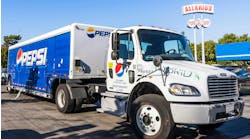The California Air Resources Board approved a $624 million funding plan for its incentive programs to assist truck fleet operators—and others—switch to zero-emission vehicles.
Under the plan, 63% of the 2023-2024 fiscal year's investment funds will bolster equitable access, resources, and support for low-income and disadvantaged communities. Many trucking fleet operations are based in these communities in California.
The Fiscal Year 2023-2024 Funding Plan for Clean Transportation Incentives also marks the launch of an expanded outreach process that includes surveys, meetings with community-based organizations, and the addition of monthly virtual meetings held in the evenings to increase access for Californians who have barriers to participating in the public process.
"The shift toward zero-emission is only possible if every Californian has access to new and emerging vehicle technology, and our funding plan reflects the importance of equitable access in working toward a clean air future," said Liane Randolph, CARB chair. "The funding plan also offers a wide range of tools to get Californians into cleaner options, from the trucks that transport goods across the state to e-bikes that can make it easier for residents to meet their everyday mobility needs."
See also: Roeth: CARB and engine manufacturers' Clean Truck Partnership good for zero-emission future
Highlights in the funding plan include:
- Continued funding to support the launch of statewide Clean Cars 4 All and financing assistance projects will provide up to $12,000 in vouchers and financing assistance to help low-income Californians replace older cars with zero-emission vehicles.
- Funding to support the new e-bike incentive project will give low-income Californians up to $1,250 vouchers.
- $375 million to help public school districts purchase zero-emission buses.
- $10 million to launch a capacity-building educational effort that will give communities the tools to plan a clean mobility project and learn how to apply for funding resources.
- Almost $60 million to support shared mobility projects, such as car or bike-sharing, in underserved communities.
- $80 million for drayage fleet operators as their transition toward zero-emission options begins in 2024.
- $14.3 million for a financing assistance program that targets operators and owners of small fleets.
- $14.3 million in vouchers for zero-emission off-road equipment, such as cargo handling or construction equipment.
CARB's incentive programs are intended to encourage the adoption of zero-emission options and have successfully supported the advancement of technology and encouraged the market to move toward cleaner options. There are now more than 100 light-duty vehicle options available for Californians to purchase and more than 500 models available for heavy-duty vehicles and equipment.
More than 1.6 million zero-emission vehicles are on Californians roads—two years ahead of schedule—and one out of every four cars sold in California is zero emission. California also recently surpassed its sales goals for zero-emission heavy-duty trucks two years ahead of schedule before regulations officially kick in.



